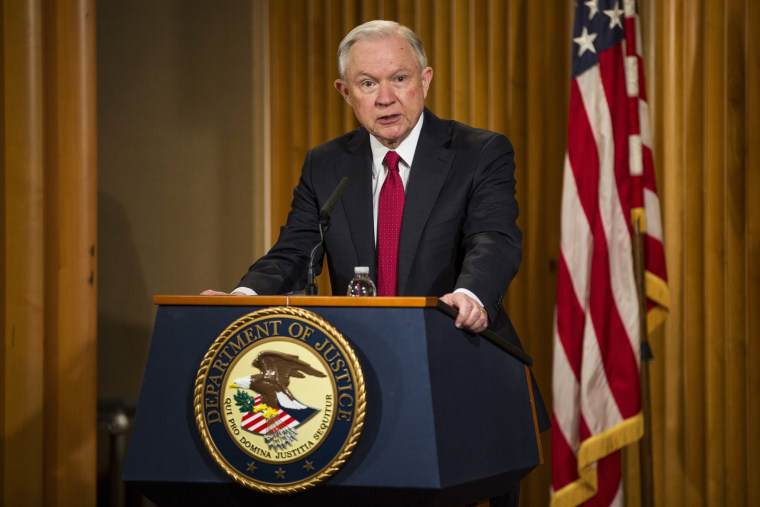WASHINGTON — The last time Jeff Sessions testified before the Senate, he faced an assault by Democrats opposed to his confirmation as attorney general. Thirty years earlier, an appearance in the upper chamber helped doom his appointment to a federal judgeship.
But his appearance before the Senate Intelligence Committee on Tuesday will likely be one of his toughest tests yet under the brightest spotlight as he faces a grilling over his contacts with Russia’s ambassador last year and his role in the firing of former FBI Director James Comey.
The stakes are tremendous for Sessions. He's already had to recuse himself from the Department of Justice's Russia investigation and clarify a statement he made under oath.
Before joining Trump's cabinet, Sessions, a former federal prosecutor from Alabama, spent years as one of the most conservative members in the Senate.
His hardline views on immigration and other issues often kept him outside the locus of decision making. But it made him a favorite of the right, and especially its ascendant nationalist wing, where he found common cause with Steve Bannon’s Breitbart News to fight the Senate's bipartisan immigration reform bill in 2013.
With the rise of Donald Trump, Sessions’ influence grew.
While many party officials kept their distance from Trump during the early days of the GOP presidential primary, Sessions became one of Trump’s earliest, most vocal, and most important supporters.
Sessions and his staff, including Stephen Miller, now Trump’s senior adviser for policy, helped turn Trump’s campaign rhetoric into policy proposals and fit them into a larger ideological framework for the businessman-turned politician.
Trump named Sessions as chairman of his campaign’s foreign policy advisory committee, and later considered him for the vice presidential slot. After he won the November election, Trump appointed Sessions to head the Department of Justice.
Sessions was one of Trump's most controversial cabinet picks, with civil rights groups accusing the then-Alabama senator of having made racially-offensive comments and Democrats accusing Sessions of being compromised by Russia ties.
Sen. Cory Booker, D-New Jersey, underscored Democrats’ unusually strenuous objections when he broke with decades of precedent to become the first senator in history to testify against a fellow senator during Sessions’ confirmation hearing.
Democrats however, were powerless to block Trump’s appointees, and Session was confirmed on a mostly party-line vote of 52–47 in early February. Since taking over the Department of Justice, Sessions has pursued an aggressive policy of cracking down on drugs and immigration, and rolling back sentencing reforms enacted by the Obama administration.
But Tuesday's hearing is likely to focus on Russia.
During his confirmation hearings, Sessions testified under oath that he had not met with Russian officials while he was involved with the Trump campaign.
However, he was later forced to clarify that by saying he had met with Russian ambassador Sergey Kislyak on two occasions. He dismissed the discrepancy by saying he did so in his official capacity as a senator, and not as a Trump campaign adviser, and that he was instructed that he did not need to disclose official meetings.
Under pressure about the undisclosed meetings, Sessions announced in March that he would recuse himself from the Department of Justice’s ongoing investigation into Russian meddling in last year’s election.
Now, Sessions is likely to face questions about whether he failed to disclose a third meeting with Kislyak at the Mayflower Hotel in Washington, D.C.
And Sessions will face questions about his involvement in Trump’s firing of Comey as well. Sessions, who as attorney general was essentially Comey’s boss, wrote a memo to Trump that the president cited as evidence for why he needed to fire the FBI director.
Comey testified last week before the Senate Intelligence Committee that he was "aware of facts that I can't discuss in an open setting that would make [Sessions'] continued engagement in a Russia-related investigation problematic."
Also at issue during Session’s confirmation hearing this year were past questions about race and civil rights.
In 1986, the Senate blocked Sessions’ appointment to a federal judgeship after several colleagues at the Department of Justice, where Sessions was serving as a U.S. attorney, testified that he had made racially insensitive comments.
Coretta Scott King, the widow of Martin Luther King Jr., wrote to the Senate Judiciary Committee saying, “Mr. Sessions has used the awesome powers of his office in a shabby attempt to intimidate and frighten elderly black voters. For this he should not be rewarded with a federal judgeship.”

